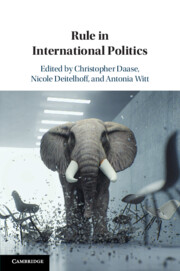The Elephant in the Room of International Relations: Rule in the Study of International Politics
International Relations scholars are increasingly studying different forms of sub- and superordination in the international system through analytical lenses such as hierarchy, hegemony, or authority. Drawing on these debates, this introduction sets out to establish the concept of rule as the defining feature of order in the international realm. More specifically, we argue that the manifold conceptual approaches to sub- and superordination in the international should be understood as rich conceptualizations of one concept: rule. We define rule broadly as constellations of formally or informally institutionalized sub- and superordination with the aim of affecting the distribution of basic goods and influence and of stabilizing expectations, regardless of whether these constellations are primarily of sociocultural, economic, or military nature. With this, we aim at advancing a research agenda that defines rule as a systematic approach to studying international politics. By promoting the concept of rule, we aim to show that rule can serve both as an integrating and a diagnostic tool for the study of the international “beyond anarchy.”


